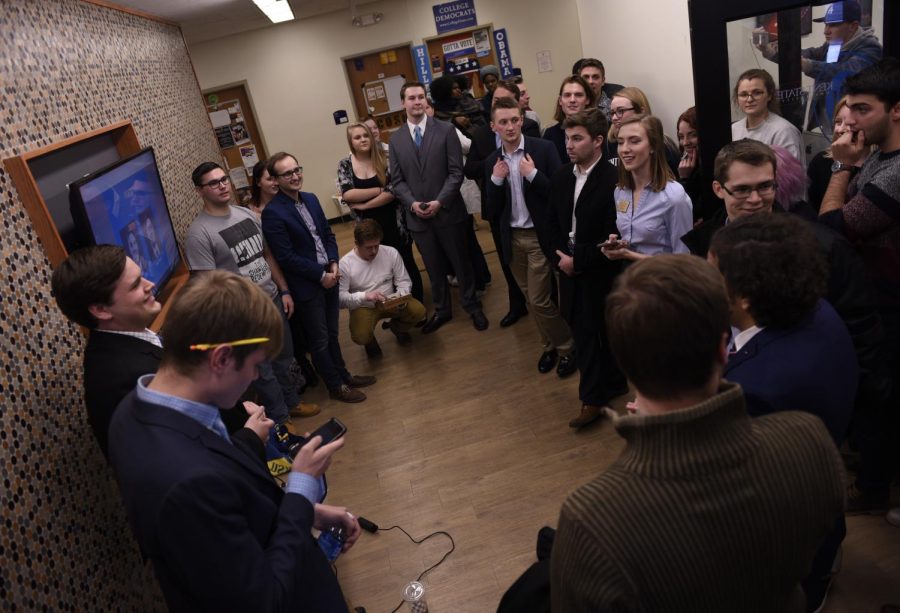Low turnout plagues USG elections
A crowd awaits results of the 2017-18 Kent State Undergraduate Student Government election outside of the USG office in the university’s Student Center on Thursday, March 16, 2017.
This year, 6 percent of the student body, or 1,622 students, voted in the 2017-18 undergraduate student elections.
During the campaign season, candidates touted the importance of outreach from Undergraduate Student Government to the community as part of their platforms. Candidates were convinced that it might result in more community participation given back to the government, including presidential candidate Logan Pringle, who lost the race to Dan Oswald.
“This year, there (were) only 1,600 total votes,” Pringle said. “I only had around 600, and Dan had around 900, so it leaves out 100 people voting, and a lot of those people are just voting because we asked them to.”
Low voter turnout for Undergraduate Student Government from KentWired.com on Vimeo.
During the campaign, which officially lasted three weeks, Pringle said he handed out 800 fliers, emailed 1,000 people, posted on nearly every Kent State social media page, Facebook messaged 800 people and spoke to more than 40 student organizations.
“Dan and I are really good friends. We probably spoke to over 5,000 people in total, and just to get only 1,600 people to vote is just … that’s awful,” Pringle said.
Oswald noticed similar patterns.
“I personally feel as if voter participation is low because of two reasons: overall brand awareness of USG and just lack of caring,” Oswald said.
In the 2016-17 elections, the total number of voters was 1,093. In 2015-16, only 1,088 voters showed up. The 2014-15 elections had 1,178 voters, said Donna Carlton, a USG adviser who has been with the government for 10 years. Carlton said that although the number of student voters fluctuates, it usually remains between 8 and 10 percent of the student body.
“If students don’t feel they have a stake in a particular person or issue and are unable to change policy, they don’t feel motivated to vote,” Carlton said.
Pringle said that he feels part of the reason students may not have been interested in participating was a lack of knowledge about what USG is, what its functions are and that “the system needs a whole new revamping.”
“We’re not doing our best to reach out to students, to show them that we basically represent them,” Pringle said. “If they don’t see that, then they just won’t vote.”
In fact, he said he believes a larger voter turnout may have changed the outcome of the election.
“There are those campaigns that win by a mere handful of votes, and even last year by one vote and one position ending in a tie,” said current USG President Samuel Graska. “The more voters we can get to turn out, the better. Always.”
Collin Czehut, the current director of community affairs for USG and the only director on this year’s election commission, said he felt one of the reasons for the low turnout was Wednesday’s school closure.
“Normally the last day, usually Wednesday, sees a spike in numbers because everyone was excited, but this year we had the weather issue — school was cancelled,” Czehut said.
Another possible reason for the disappointing engagement was problems with the physical USG website, Czehut said. The website had compatibility issues for Mac users, and there was a “next” button featured at the bottom of the page that, instead of saving the voter’s data, erased it when clicked.
Some candidates found more creative ways to campaign.
“I ran around on Monday in a golf cart just yelling at people, ‘Hey, go vote for USG,’ and most people really just look at me like, ‘Why?,’” Czehut said. “And they don’t really see a point because I don’t know if they see our impact as much.”
The problem is something recognized within USG.
“I think we finally realized (the problem) after two years of seeing (the low turnout), and we are really, really trying to push for (more student voters),” Czehut said. “I think next year, we’re going to have record numbers.”
If USG is to accomplish this growth, however, it will be up to Oswald and the new administration.
“I would love to get more voter participation, and the main idea of mine to get that is to educate students more throughout the year on what USG does,” Oswald said. “If they care about what we are doing, they will be more inclined to vote.”
Cameron Gorman is a senior reporter, contact her at [email protected].



